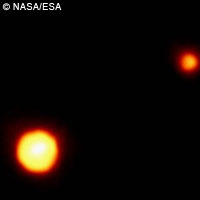Pluto not planet, say astronomers
The world's astronomers have voted to strip Pluto of its planetary status in a shock result at the International Astronomical Union's (IAU) general assembly in Prague on 24 August. The assembly had been expected to accept proposals put to the IAU last week, which would have confirmed Pluto's planetary status and added Pluto's moon Charon, 'Xena' - also known as 2003 UB-313, and the asteroid Ceres. However, the latest news actually reduces the number of planets in our solar system to eight - the last planet is Neptune. A new class of 'dwarf planets' has been created, which includes only Ceres, Pluto and Xena. The IAU expects to add further dwarf planets to the list in the coming months and years, with up to a dozen already on the shortlist. While Pluto is a 'dwarf planet', it is in a special class of 'trans-Neptunian' objects. The IAU will set-up a process to name these objects in due course. The official definition of a planet is now as follows - A celestial body that: - is in orbit around the sun; - has sufficient mass for its self-gravity to form a round shape; - has 'cleared' the neighbourhood around its orbit. The definition of a 'dwarf planet' is very similar, with the first two definitions identical, but then: - has NOT 'cleared' the neighbourhood around its orbit; - is not a satellite or moon. All other objects will now be known as 'small solar-system bodies'. Part of the initial proposal was that Charon, Pluto's moon, would have qualified as a planet. This revised definition removes Charon, and reinstates it as a moon. The demotion of Pluto from a planet to a dwarf planet will mean that the textbooks will literally have to be re-written. Despite Pluto's reduced stature, NASA's New Horizons probe, which launched in January 2006, will study Pluto and other Kuiper belt objects, meeting Pluto-Charon in July 2015. However, the vote has prompted a fierce backlash from some who were strongly in favour of keeping Pluto as a planet. The vote reputedly attracted less than 500 of the 2,500 members registered for the Prague conference, leading some to argue that the vote had been 'hijacked', and that the definitions between 'planet' and 'dwarf planet' are 'sloppy'. For example, the orbits of Neptune and Pluto cross-over, meaning that Neptune, which is 17 times the size of Earth, should also be reclassified as a 'dwarf planet'. The decision will have consequences for Astrologers, who include Pluto in their predictions. Those predictions which include Pluto could now be invalid, but able astrologers would of course have predicted this.
Countries
Czechia



